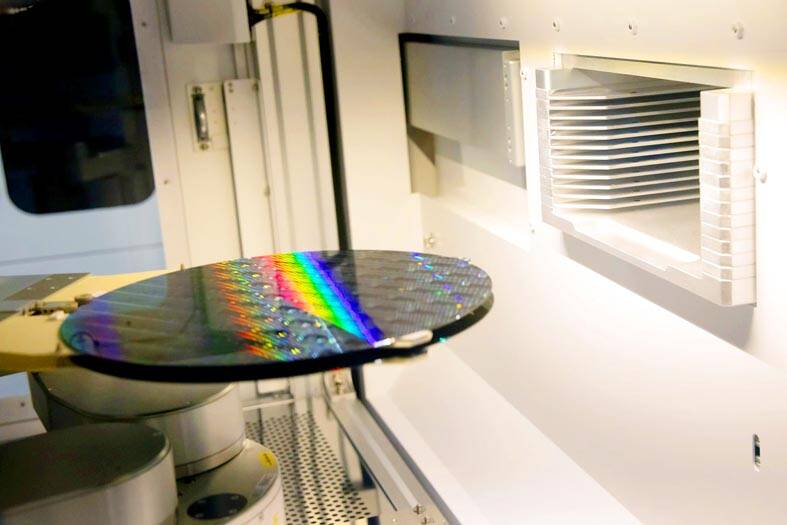The US is to send officials in charge of chip development to Taiwan, Japan and South Korea to promote cooperation in the global semiconductor supply chain, the US Department of Commerce said on Tuesday.
Chips Program Office Director Michael Schmidt announced the visit, which marks the first time officials from the office are to visit the three nations since it was set up in September last year.
“As semiconductors and technologies continue to evolve, the United States will keep working with allies and partners to develop coordinated strategies to ensure that malign actors cannot use the latest technologies to undermine our collective economic and national security,” Schmidt said.

Photo: Bloomberg
“In implementing the CHIPS and Science Act, the Department of Commerce is engaged extensively with key partners and allies, including authorities in the Republic of Korea [South Korea], Japan and Taiwan, as well as the Indo-Pacific Economic Framework, the European Union, and the United States Trade and Technology Council and North American Leaders’ Summit,” he said.
While the office did not disclose any details about Schmidt’s trip, a senior official from the department, who asked not to be identified, said the delegation would include Sam Marullo, senior policy adviser to the office, and Frances Chang, who supervises international exchanges in the office.
Asked whether the delegation would meet Taiwan Semiconductor Manufacturing Co (TSMC) executives, the unnamed official said only that the department would release details at an appropriate time.
“We intend to make this a really important part of our discussions with [South] Korea, Japan and Taiwan,” the official said.
According to the CHIPS Act, the US government is to inject US$52.7 billion into the US semiconductor industry to shore up its manufacturing, and research and development strength.
Funding would include US$39 billion in subsidies for companies that build new facilities and expand production capacity in the US.
The department is reportedly planning to take applications in late June from companies eyeing the subsidies.
The department also announced the so-called National Security Guardrails, which are to ban recipients of US government subsidies from investing in most semiconductor manufacturing in foreign adversary countries — China, Russia, Iran and North Korea — for 10 years after the date of being awarded funding.
The measures also aim to limit funding recipients from engaging in joint research or technology licensing efforts with any of the four countries to develop a technology or product that raises national security concerns, it said.
TSMC is building fabs in Arizona that are to make chips using the 4-nanometer and 3-nanometer processes, with mass production scheduled to begin next year and in 2026.
The unnamed department official declined to comment on whether TSMC is seeking subsidies from the US government.
Hsinchu-based GlobalWafers Co has also begun construction of a 12-inch silicon wafer plant in Texas, with the aim of beginning mass production next year.

Taiwan has received more than US$70 million in royalties as of the end of last year from developing the F-16V jet as countries worldwide purchase or upgrade to this popular model, government and military officials said on Saturday. Taiwan funded the development of the F-16V jet and ended up the sole investor as other countries withdrew from the program. Now the F-16V is increasingly popular and countries must pay Taiwan a percentage in royalties when they purchase new F-16V aircraft or upgrade older F-16 models. The next five years are expected to be the peak for these royalties, with Taiwan potentially earning

POSITIVE DEVELOPMENT: Japan and the US are expected to hold in-depth discussions on Taiwan-related issues during the meeting next month, Japanese sources said The holding of a Japan-US leaders’ meeting ahead of US President Donald Trump’s visit to China is positive news for Taiwan, former Japan-Taiwan Exchange Association representative Hiroyasu Izumi said yesterday. After the Liberal Democratic Party’s landslide victory in Japan’s House of Representatives election, Japanese Prime Minister Sanae Takaichi is scheduled to visit the US next month, where she is to meet with Trump ahead of the US president’s planned visit to China from March 31 to April 2 for a meeting with Chinese President Xi Jinping (習近平). Japan and the US are expected to hold in-depth discussions on Taiwan-related issues during the

‘LIKE-MINDED PARTNER’: Tako van Popta said it would be inappropriate to delay signing the deal with Taiwan because of China, adding he would promote the issue Canadian senators have stressed Taiwan’s importance for international trade and expressed enthusiasm for ensuring the Taiwan-Canada trade cooperation framework agreement is implemented this year. Representative to Canada Harry Tseng (曾厚仁) in an interview with the Central News Agency (CNA) said he was increasingly uneasy about Ottawa’s delays in signing the agreement, especially as Ottawa has warmed toward Beijing. There are “no negotiations left. Not only [is it] initialed, we have three versions of the text ready: English, French and Mandarin,” Tseng said. “That tells you how close we are to the final signature.” Tseng said that he hoped Canadian Prime Minister Mark Carney

STAY IN YOUR LANE: As the US and Israel attack Iran, the ministry has warned China not to overstep by including Taiwanese citizens in its evacuation orders The Ministry of Foreign Affairs (MOFA) yesterday rebuked a statement by China’s embassy in Israel that it would evacuate Taiwanese holders of Chinese travel documents from Israel amid the latter’s escalating conflict with Iran. Tensions have risen across the Middle East in the wake of US and Israeli airstrikes on Iran beginning Saturday. China subsequently issued an evacuation notice for its citizens. In a news release, the Chinese embassy in Israel said holders of “Taiwan compatriot permits (台胞證)” issued to Taiwanese nationals by Chinese authorities for travel to China — could register for evacuation to Egypt. In Taipei, the ministry yesterday said Taiwan